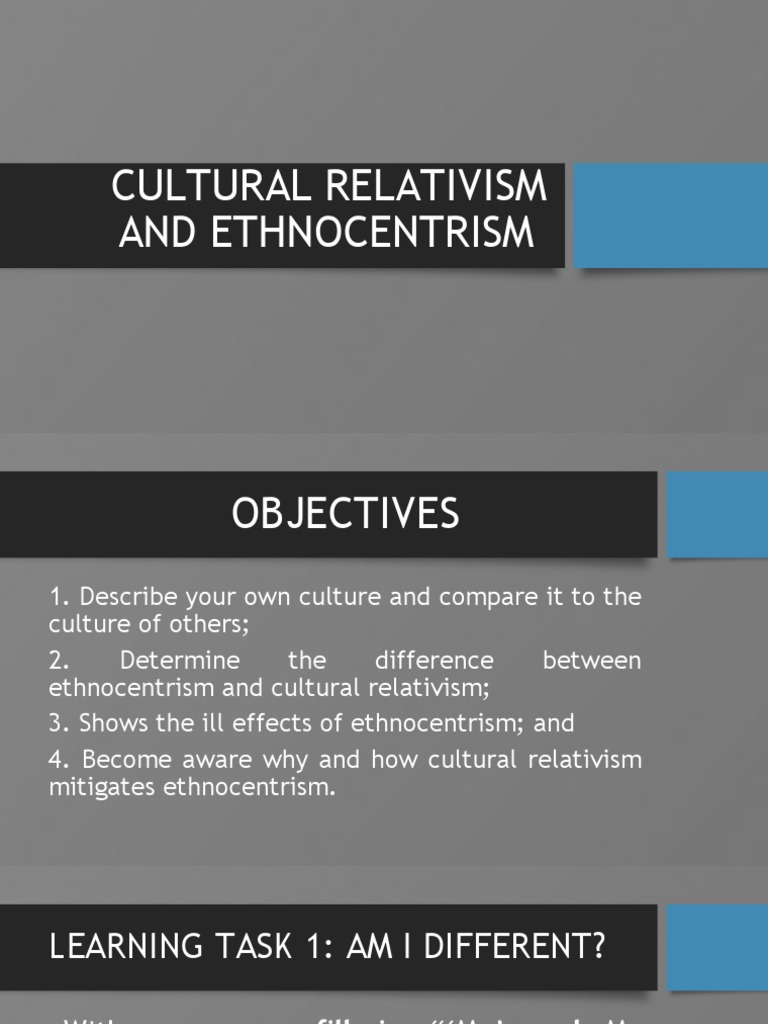Ethnocentrism and cultural relativism are two pivotal concepts that shape our understanding of human behavior and social structures across diverse societies. Ethnocentrism, the propensity to evaluate other cultures through the lens of one’s own cultural biases, often informs perceptions of superiority and inferiority among cultures. In contrast, cultural relativism advocates for the understanding of cultural practices and beliefs within their own contexts, emphasizing that no culture is inherently superior to another. This dichotomy raises an intriguing question: Can we truly appreciate cultural diversity while remaining anchored to our own cultural perspectives?
To dissect these concepts further, it is essential to consider their historical underpinnings. Ethnocentrism has roots in the survival instincts of human beings, where tribes and communities historically relied on intrinsic values, customs, and beliefs to establish identity and cohesion. The tribal mentality, while fortifying group solidarity, has inadvertently fostered discriminatory practices, wherein outsiders are viewed with suspicion or hostility. Consequently, this creates a scaffold for misunderstanding and cultural misinterpretation, potentially leading to social and political tensions.
Conversely, cultural relativism emerged as a counter-narrative, championed by anthropologists and sociologists who labored to dismantle the biases entrenched in ethnocentric views. Cultural relativism posits that one must endeavor to comprehend a culture on its terms. This approach fosters empathy and nuance, promoting an inclusive dialogue that appreciates differences. It acknowledges that cultural norms and values are often contextually bound, cultivating a richness in human experiences that transcends simplistic categorizations of right and wrong.
The interplay of these two constructs engenders a philosophical and practical challenge: How do we balance our innate biases with the necessity for mutual understanding and respect across cultures? This challenge becomes increasingly salient in an era marked by globalization and migration, where cross-cultural interactions occur daily. As people navigate diverse cultural landscapes, ethnocentrism may surreptitiously influence judgments and behaviors.
Moreover, this duality informs the way we address global issues such as climate change. For instance, different cultures perceive environmental stewardship and sustainability through unique lenses, shaped by historical, geographical, and economic contexts. Ethnocentric perspectives may dismiss indigenous practices that prioritize harmony with nature in favor of industrialized approaches deemed more ‘efficient’ by culturally dominant societies. This dismissal can lead to environmental degradation and social injustice, as the wisdom of local practices becomes overlooked, overshadowed by a singular, often damaging viewpoint.
Then, one might ponder: Does the embrace of cultural relativism equate to a passive acceptance of all cultural practices, regardless of their impact on human rights or the environment? This concern highlights an essential critique of cultural relativism; the potential to excuse harmful practices under the guise of cultural respect can lead to moral paralysis. For example, practices such as child labor or gender discrimination are justified by cultural arguments, stymying efforts toward universal human rights and the protection of vulnerable populations.
To navigate this complexity, it is vital to foster a dialogue that seeks common ground. In addressing ethnocentrism, it’s pivotal to cultivate self-awareness. Acknowledging one’s biases fosters an environment conducive to learning and appreciating alternative viewpoints. Education plays a crucial role here, ensuring that individuals are equipped with tools to challenge their assumptions and engage meaningfully with other cultures.
The role of intercultural communication is also significant. This form of dialogue can bridge the gap between ethnocentric views and cultural relativism, promoting an exchange wherein diverse perspectives are shared, challenged, and ultimately synthesized into a broader worldview. Training in intercultural communication can pave the way for enhanced understanding, fostering environments where differences are not merely tolerated but celebrated.
Another productive strategy involves engaging in comparative analyses of cultural practices. By examining and contrasting varying cultural approaches to shared issues, individuals can appreciate the merits of different methodologies while remaining cognizant of their cultural orientations. Such comparative frameworks unveil underlying patterns that may foster collaboration rather than conflict. They can reveal how multiple approaches to environmental conservation, for example, can coexist and inform integrated strategies that benefit planetary health.
Ultimately, the reconciliation of ethnocentrism and cultural relativism hinges on recognition and respect. While both concepts reflect essential human tendencies, there must be room for critical discourse at their intersection. Recognizing the validity of diverse cultural narratives while simultaneously challenging harmful practices amplifies our collective potential to co-create sustainable solutions to global challenges.
In conclusion, navigating the realms of ethnocentrism and cultural relativism necessitates a delicate balance. Can we engage with one another’s cultural narratives without succumbing to our biases? The challenge is steep; yet, the rewards of embracing a more profound intercultural understanding are immeasurable. In doing so, we not only foster a more inclusive society but also bolster our collective efforts to address pressing global issues, marking a path toward a more sustainable and equitable world.
